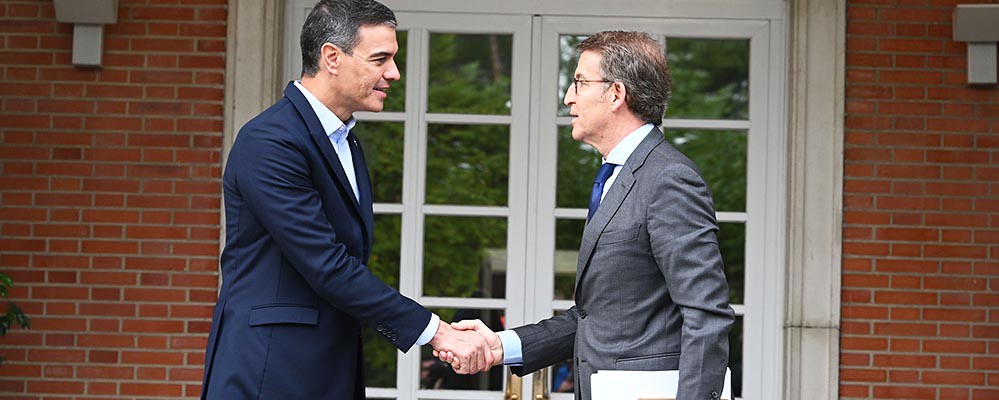The reason why the centrist parties have turned socialist and will get worse
For more than 200 years, the political map has been divided into two factions: right and left. In the middle of them would be the so-called "centrism".
If we equate the right with conservatism and the left with socialism, what is centrism? Apparently it would be a mixture of both factions. There are, in fact, positions that are called "center-left" and "center-right", to refer to those people and parties closest to the political center. What many people don't take into account is that this is a variable map, and this means that even if the right doesn't change its positions, the rest of the map has changed: it is stretching to the left.
In recent years, the left has undergone a process of radicalization, which has reversed the trend that occurred in the West in the postwar period, when the so-called social democrats gradually abandoned the Marxist theses and accepted the market economy and liberal democracy. For some time now, the so-called center-left has been assuming theses that until then had only been defended by the extreme left, such as radical feminism and gender ideology (and especially its most radical version, queer theory).
The right could have taken advantage of this opportunity to demonstrate the growing leftist extremism , but decided to start a flight towards the center in an attempt to occupy that space that it believed had been abandoned by the left. When trying to occupy the center, the right abandoned its usual positions and was dragged along by the left in its process of radicalization. How could this happen? Well, for the simple reason that the political center is an equidistant position: with a more radical left, the center moves to the left. The greater the extremist drift of the left, the greater the displacement leftist of the political center.
The problem with centrist parties is that society does not move at the same pace as them. The growing divorce between centrism and its voters has given rise to a new right, which has ended up occupying that space abandoned by the center-right. This new right has begun to wage an ideological battle that centrism cannot wage, due to its equidistance. This represents a big problem for the centrist parties, which were very calm when they had no competition from the right. Now that they have it, centrism must choose: continue to let itself be dragged by the left or recover the lost positions. The majority of centrism has chosen the first option, because they no longer know how to do anything other than let themselves be dragged by the left.
That is why it is increasingly difficult to distinguish between a centrist and a socialist. Due to the shift of the left towards the extreme left, which is reaching heights unimaginable just a few years ago, strong>today's centrists are occupying the ideological coordinates of yesterday's socialists, and the process does not stop, so the leftist drift of centrism is doomed to get worse, as we are already verifying. In fact, centrism has already been assuming old positions from the extreme left (such as those cited from radical feminism and gender ideology) just as the left did. Centrism today is the socialism of 10 or 15 years ago.
This presents a challenge for the new right that remains faithful to conservative approaches. Does it make sense for the conservative right to feel related to an openly socialist centrism? How to reconcile the pro-life positions of the conservative right and the abortionist militancy that centrism has adopted in its journey to the left, for example? In Poland, this rupture already took place years ago: the conservative right (the Prawo i Sprawiedliwość party, PiS) is already a direct rival of the centrist Platforma Obywatelska (PO, openly pro-abortion and allied with the left).
In Spain, this break has not yet taken place, but Vox (conservative and pro-life party, partner of the PiS party) has an increasingly difficult relationship with the Popular Party (PP, centrist and partner of the PO ), who has been assuming a large part of the ideological theses of the left and whose general secretary he has stated that he feels closer to the socialists of the PSOE than to Vox. The point is that if the PP continues its journey to the left, it will be untenable for Vox to agree with that party and it will have to assume that the PP is as much a rival to the right as the PSOE.
---
Photo: La Moncloa. The socialist Pedro Sánchez, president of the government of Spain, greeting Alberto Núñez Feijóo, president of the Popular Party, during his visit to the La Moncloa palace.
|
Don't miss the news and content that interest you. Receive the free daily newsletter in your email: Click here to subscribe |
- Most read
- The 'hole' without civil flights around Paris during the opening of the Olympic Games
- Spain vetoes the Russian frigate 'Shtandart', which intended to reach Vigo, in all its ports
- The interior of the Statue of Liberty torch and the sabotage that canceled its visits
- The ten oldest national flags in the world that are still in use today
- The BNG boasts of the support of a terrorist group and a dictatorship at a public event
- The Russian intelligence document that sparked a hoax about French troops
- A virtual tour of ancient Rome in full color, just as it was in its heyday

 ES
ES





Opina sobre esta entrada: